
Photo: Brooke Palmer ©2020 CBS Broadcasting Inc. All Rights Reserved
Jen Richards has made a career for herself by speaking her mind, and being sincere. Her digital series Her Story, which she wrote and starred in, announced her as one of the emerging voices of transgender people in showbusiness. Her subsequent work acting in Nashville, Tales of the City and Mrs. Fletcher also garnered her praise, as did her appearance in the 2020 documentary Disclosure.
Now Richards wades into scary territory with a recurring role on the CBS Thursday night crime series Clarice. She also acts as a consultant for the show. The show follows the iconic heroine of The Silence of the Lambs in the wake of the capture of the serial killer Buffalo Bill and the escape of Dr. Hannibal Lecter. While coping with her own trauma of the case, Clarice (now played by Rebecca Breeds) begins investigating another series of untimely deaths. The FBI suspects a serial killer, though Clarice has doubts. In the series, Richards plays the role of Julia, an accountant for a pharmaceutical company with information that suggests the murders are somehow linked to the company.
For Richards, stepping into the role of Julia represents a moment of personal and professional catharsis. Fans of Disclosure–and longtime readers of Queerty–will know the actress has an intense, personal connection to The Silence of the Lambs. More on that in a moment.
We scored time to discuss that personal connection with Richards, the legacy of The Silence of the Lambs, and evolving portrayals of transgender characters just ahead of her introduction on the show. Richards joins the cast of Clarice for a multi-episode arc beginning May 13.
How about we take this to the next level?
Our newsletter is like a refreshing cocktail (or mocktail) of LGBTQ+ entertainment and pop culture, served up with a side of eye-candy.
So I think the best place to start might be in acknowledging you have a deeply personal connection to this story. When we chatted before for Mrs. Fletcher, you told me a haunting anecdote about coming out to a friend who thought being transgender meant you were like Buffalo Bill in The Silence of the Lambs.
Yeah.
You repeated that story in Disclosure. So the idea that (gasp) Jen Richards is doing Clarice is kind of a big deal. When this opportunity came to you, what was your reaction?
Isn’t it bizarre what a full-circle that is?

Photo: Brooke Palmer ©2020 CBS Broadcasting Inc. All Rights Reserved
It’s amazing.
I have to admit I didn’t have any apprehension because it first came to me through Nick Adams at GLAAD. I just adore and trust Nick. He’s the Director of Trans Representation. He called me and told me about the show and that Alex Kurtzman, Elizabeth Klaviter and Jenny Lumet saw Disclosure and realized they needed to do something. So the way it was framed to me, just from the start, I knew they would do right.
That’s marvelous.
I had some friends work on the Star Trek shows that Alex does, so there was enough groundwork there to think it was a good opportunity. And I was just coming on as a consultant at first. I was going to be there to help shape the character and help them avoid any potential pitfalls. I thought they would cast the role with someone younger.
[Laughter]
I felt like I had enough distance from it that if everything went terribly wrong I could distance myself from it. Then they asked me to be in it. At that point, I’d been in the writer’s room and came to completely trust that everyone was on the same page. They asked smart questions. They really cared. I never felt othered. And they actually had another trans writer, Eleanor Jean, who was also a writer on Mrs. Fletcher, writing the first episode arc. So all the pieces were there. And I went from hoping it wasn’t bad, to thinking it might actually be really good.
Awesome. What were your apprehensions in taking the part? It’s one thing to write for a show to which you have an emotional connection, shall we say. It’s another to actually exist in that world, on-screen. Does that have its own onus to it?
I have to be honest. My first reaction was I’m writing two other TV shows right now and they want me to act? How the f*ck am I gonna do that?
[Laughter]
It also turned out I would have to leave the country three weeks after I got married.
Oh my lord.
So my main concerns were all very practical. Beyond all that, I was just excited. Acting for me is just fun. At the end of the day, it’s something I enjoy doing. I love writing, and I’m a writer first and foremost. But it can be very lonely, very isolating, even traumatic when you’re writing dark things. So when I get a chance to be on screen, it’s a chance to get out of my own head and get out in the world to work with other people. There is a little bit of apprehension—just to be a trans actor on screen, I know there’s going to be negative blowback to that. So if I had concerns at all, it was just to be on a TV procedural.
Sure.
CBS has a slightly more conservative audience. Procedurals have a more conservative audience. So that was a little bit of fear. But it subsided as soon as I got on set and got to know the cast and the crew. Even if some audience person doesn’t like talking about trans issues, the show itself cares. It supports me and wants that story there. I felt like part of the family from the start. Multiple members of the cast & crew have trans kids or trans friends. It’s such a different world. All my fears just trickle away now.

Jen Richards and Julia Lawson
Photo: Brooke Palmer ©2020 CBS Broadcasting Inc. All Rights Reserved
Congratulations on getting married, by the way.
Thank you.
In your debut episode, Julia and Clarice have a very pointed discussion about the language Clarice used in talking about the Buffalo Bill case. It’s not hard to imagine you having that conversation with the producers of this show, Jonathan Demme who directed the movie, or Thomas Harris who wrote the novel. Did you write that dialogue yourself?
I would be thrilled to take credit, but no. That is Eleanor Jean, and she’s fantastic. Just a really great writer. We certainly talked about the scene in the writer’s room, but Eleanor put it together. I did do some improvising when we were on set, so there are a couple of little things here and there that are my touches. But all credit on that goes to Eleanor. What I think she did so well in that scene—it has to work on two levels, right?
Yes.
On one level it is trans people talking to Thomas Harris, Jonathan Demme and the entire world really. It’s the trans community telling the world “This is how this hurt us.” And even if you say, “Well, they say he’s not really trans,” they were all complicit in this narrative that had a material impact on our lives.
Sure.
So it needed to work on that level just to get that catharsis for the audience. But it also has to work on a character level. You have to believe that Julia feels a need to tell that to Clarice specifically in that moment prior to helping her on the case. Eleanor set up that needle really well, and frankly, I think I did too. I think the scene works really well.
What kind of emotional catharsis does doing a scene like that offer you? As you say, this is a full-circle moment for you.
It really does heal it. It closes one chapter so I can move on. It’s truly cathartic. I’m such a fan of the movie. I love the characters. I love Clarice. I love women characters trying to overcome social oppression and discrimination. I love everything about [The Silence of the Lambs], except this one part which stings. And as a transperson, I’m pretty accustomed to media that kisses me on one cheek but then stabs me on the other side. It’s just something you come to live with. But it’s such a personal thrill to get to take the knife out and show that up. It really was profound. And credit to Deborah Kampmeier, our director, who really wanted the scene to land. She knew the importance of the scene, she did her research. She knew my work. She’d seen Disclosure.
That’s terrific.
She had me improvise the scene to warm up, and to say a lot more than what we see. Without cutting, I went back in to the scene and did it again. I felt all that emotion I generated in talking about it in character carried over. Most of that you see on screen. So it’s great writing by Eleanor, great creation of a character by our whole team, and great directing by Deborah. It takes a village to make a moment like that work.
And a good actor, I would add.
Thank you.

Photo: Brooke Palmer ©2020 CBS Broadcasting Inc. All Rights Reserved
It’s wonderful to watch. The other important issue to address in Julia’s storyline is that she’s taking a huge risk as a transwoman in helping the FBI. That makes her something of a reluctant hero. But this is also an issue that transgender people still face—the idea that being outed could ruin a career. How do you think transpeople—or queer people more broadly—should balance allegiance to the community with a need for privacy?
That’s a tough one. There’s not a one-size-fits-all solution. I’ve had people tell me “Oh, you didn’t have to tell me you were trans. I just see you as a regular woman.” And there is a certain amount of freedom that comes to that, but there’s also an abdication of responsibility. While I can’t speak for anyone else, I know for me, when I came out as trans, it was the trans community that was there for me. This was 10 years ago. It was a tough time, and there were people who had a much harder time than me. I’m thinking particularly of black transwomen in Chicago who I knew reached out a helping hand. The first public event I went to as an out transperson was a memorial for a black transwoman who was murdered in Chicago.
Wow.
She was one of three that year, and there was never any justice. No one was ever caught. So my entrance to the trans community was always marked by trauma and pain and violence. Because I’m white, because of my education, because of my capacity to articulate issues in a way other people found compelling, I’ve been able to go beyond what I think a lot of transpeople are able to achieve in life. And I’m very grateful for that. And if my speaking out, being loud about things, if my aggressively fighting for trans inclusion and storytelling—whatever I can do to give back, feels more like a privilege to me.
I understand.
That being said, I don’t know that I would begrudge someone else who just wanted to transition and live privately. That’s just not my personality, but I can understand it well enough that a character like Julia made sense to me. As soon as I found out she was going to have three episodes, it was important to me that she have an arc. I wanted Julia to be a different person at the end of those three episodes. Without spoiling too much, I wanted to start her from the place of being private—don’t look at me, don’t get too close—to her being confronted with the question: what does it mean to have all that when other women are suffering? Why don’t you do something about it? I think on a more subtextual level, that can be a way of indicting white transwomen who can pass and just disappear, enjoy their privilege and turn their back on the community. So I’m excited to see that journey.
Related: The Queer History Of Hollywood Is Available For Your Viewing Pleasure
Out of curiosity, have you read any of the Harris books? How do you feel about the treatment of queer characters and women in those stories?
No. How do I put this nicely? I’m weak. I’m a coward. I do not watch horror films…
[Laughter]
…Read horror novels, or gross, horrible things because they get stuck in my head and never escape. And my head is already full of the horrors of life. I’m writing a true crime show now, and it haunts me. I get nightmares. So I tend to watch cheesy sitcoms and read fantasy novels.
[Laughter]
There’s nothing wrong with that. I understand completely. I would be interested to know your thoughts though. I did read the books, and what stood out to me was as problematic as any of the movies are when it comes to queer issues, the books are so much more violent and queer-phobic.
I have heard that.

Photo: Brooke Palmer ©2020 CBS Broadcasting Inc. All Rights Reserved
We could do a whole dissertation on this, but in short, one reason why Silence of the Lambs is such an amazing movie is that it takes the character of Clarice and makes her a feminist hero. She’s not really like that in the book. She’s kind of there to be tortured.
Wow.
Ted Tally and Jonathan Demme tweak that, so instead of being a somewhat masochistic victim, she’s a female hero always gazed at through the male lens.
That’s really interesting. You know, there were passing comments in the writer’s room. Some of the writers know Thomas Harris well, and so there were comments like that.
And the books also have this homophobia that is hard to take. I don’t know if Harris sees transpeople and cisgender gay people as being the same thing. And in Hannibal, in particular, there are some very homophobic, awful characters.
It’s interesting to know that about The Silence of the Lambs the movie versus the book. One thing that’s interesting about Clarice is the way they tease out social issues. Obviously, there’s my character dealing with the legacy of Buffalo Bill, but there’s also Ardelia, who is just the black best friend in the movie. In the series she takes on racial discrimination at the FBI, and calls out Clarice for how her career advances because she’s white. So it’s interesting the way we’re always shaping media to address our current social concerns, but also the needs and desires of other people that make it.
Yes.
To see that transmutation from the novel to the movie to the TV series is—you’re right. It’s a whole thesis!
Well, all that is to ask—and this came up when I interviewed Laverne Cox & Sam Feder for Disclosure—I am someone that loves The Silence of the Lambs and Hannibal and even the books, despite the homophobia and misogyny. When you look at something like Silence which is problematic for transpeople but also a brilliant movie, how do you find yourself reconciling the two? How do you object on one hand, but love it on the other? For you, is it just as simple as that?
I think it really is that simple. We have two hands—most of are lucky enough to have two hands. I was raised in Mississippi. I sometimes joke that it taught me how to see something as horrific and beautiful at the same time.
[Laughter]
Because Missippi is both beautiful and horrific at the same time. I think that’s human nature. It’s certainly American nature: there’s very little about life that is unalloyed good or bad. Most of the best things are also a mix that is constantly shifting. I’m very much a social justice type. I will gladly wear that moniker. But I also see people on social media almost take it too far.

How so?
It’s the whole am I allowed to like this? I see that question a lot. And it’s coming from a really good place, from people who don’t want to participate in media that does harm. I love that innocence, but media that adheres perfectly to a utopian vision of the world isn’t art. It’s propaganda. And I’m much more interested in art. Sometimes that means getting hurt by things I love.
Well said.
A good example for me is How I Met Your Mother—one of my all-time favorite shows. It’s also one of the most transphobic shows I’ve ever seen. I can’t even count the number of trans jokes they make in that show. It’s just a running gag. Whenever I watch, I’ll be laughing, crying, and then ouch, yeah, ok, they think I’m a joke. And that hurts.
Naturally.
But it’s not a kind of hurt I resent. It’s the kind of hurt that keeps me empathetic and tender. It makes me ask what are my blind spots? Without having been hurt myself, without having that compassion, I’m not sure I would be as aware of the way media hurts others. Maybe someday we can have compelling media that doesn’t do that. I certainly think we’re getting better.
Great Answer. But, in sum, is there anything else you would want to tell Thomas Harris, Ted Tally or Jonathan Demme, given the chance? What would you say if you could sit down with them?
I would probably talk to them about tea.
Wait, like, tea?
Tea, the drink. I like tea.
[Laughter]
I like talking about tea. I say that because I was in a seminar recently about personal justice issues in television…and the way we learn prejudice through media, and how we change prejudice through media. Having a character try to change an audience’s mind is rarely effective. It can be; I think about that moment in Clarice, because it’s all about empathy, as being very effective. But really, what’s most effective, is the wallpaper, the background, the things taken for granted and not drawn attention to. So if a trans character is just part of a show, and it’s not about their being trans, that actually, in a weird way, reprograms the unconscious part of our brain to say “That’s normal.”
Right.
So if I had the opportunity to talk to them, I’d like to connect with them about something completely unrelated, just so they feel a connection to me on a human level. They can walk away with the feeling of oh, I would never want to hurt that person. So that’s why I half-jokingly, but half-seriously say I’d talk about tea. I can talk about tea a long time.
So will we see Julia in future seasons of Clarice?
I hope so. I really love the cast and crew. They’re such wonderful people. I love filming in Toronto. I keep joking that they can bring me back next season when all the FBI agents need their taxes done.
[Laughter]
It’d be a riveting episode. But I would love to come back to Clarice, or anything Alex or Jenny do on CBS or elsewhere. They’re a great creative team..
Clarice airs Thursdays on CBS. Jen Richards makes her debut on the show May 13.


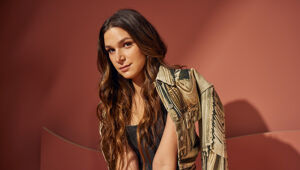
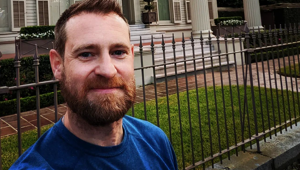
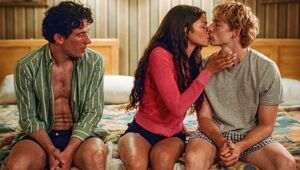
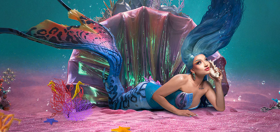

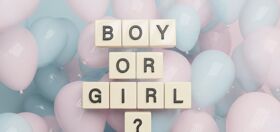
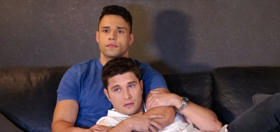
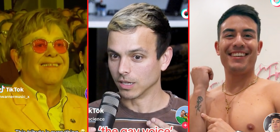
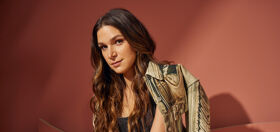


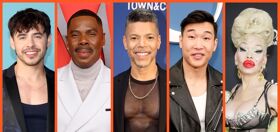


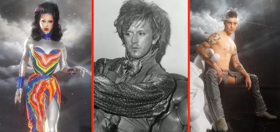
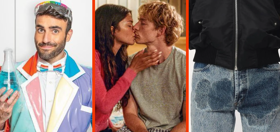
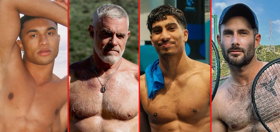
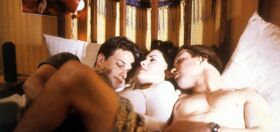
revashayne
Buffalo Bill was NOT trans, it’s stated explicitly in the film. He thought he was, which is not the same thing. He was essentially a “cis” white gay man. Just because her friends misunderstood the character does not make the character or movie transphobic. If anything, one could say it was “homophobic.”
bsg1967
Exactly and also in the novel. Awful show from the hack who gave us Star Trek Discovery Alex Kurtzmen. Cancel this garbage and give us Hannibal back.
wooly101
I watched two episodes and then got board. Another woke series.
inbama
If you’re a fan or at least familiar with the Merchant/Ivory films “A Room With A View,” “Howard’s End” and “Remains of the Day,” do not miss Eric Idle’s radio play “What About Dick?” Tracey Ullman, Jane Leeves (of Frazier), Eddie Izzard, Russell Brand, Tim Curry — this is one heck of cast delivering the style of gay humor once known as “camp.”
Streaming now on Netflix.